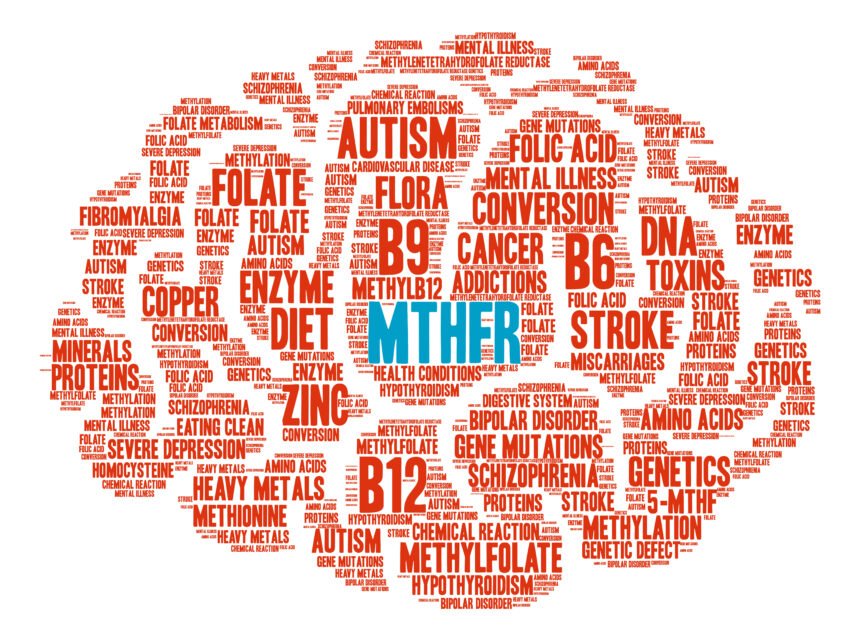The term MTHFR has been popping up a lot lately in the medical news. If you have nothing to do with medicine, this term might sound rather weird to you. That probably made you wonder what it actually is. Whether you are somehow involved in the medical industry, or you are simply curious by nature, you’ll find the definition you are looking for here.
MTHFR stands for methylenetetrahydrofolate reductase, which is an enzyme responsible for breaking down the amino acid known as homocysteine. The reason this enzyme has been getting so much attention lately is because of its ability to mutate. As you might have guessed, mutation is not a good thing in medicine.
In fact, MTHFR mutation can completely incapacitate this enzyme and prevent it from serving its purpose, which is, as we have already mentioned, to break down homocysteine. Before we go any further, here’s something you need to keep in mind. We inherit two MTHFR genes, one from each parent. The process of mutation can, unsurprisingly, affect one of these or both of the genes.
What do you think happens when the gene mutates and becomes unable to function properly or its functioning gets more or less hindered? If you use your logic, you’ll get the answer to this question in no time. The level of homocysteine our blood will rise, and that can be the cause of numerous health issues, including birth abnormalities, certain cancer types, as well as mental health disorders.
Symptoms
The truth is that most people don’t even find out that they have this mutation until they undergo genetic testing. Let’s face it, though; most of us won’t bother to undergo any tests like these unless we have started exhibiting certain severe symptoms that might make the doctors suspect MTHFR is the cause. I said “severe” symptoms, because the lighter ones will definitely go unnoticed and unchecked by most individuals.
The symptoms, regardless of their severity or lack of severity, vary from person to person, which makes this condition that much harder to detect. It’s most likely that you will never even know the status of your MTHFR mutation, because experts will focus more on treating the issues that it causes than on confirming that it is the cause. This means that when we talk about symptoms, we are actually talking about medical health problems that this can cause, so let us take a look at those.
Conditions Related to MTHFR
While this gene is still being thoroughly researched and there might not be enough evidence to support every single claim that’s been made about it, one thing is for sure. It is being linked to a large number of diseases and disorders. Further researches will probably shed some more light on this whole topic in the future, but let’s what we actually know to date.
For starters, MTHFR has been linked to cardiovascular and thromboembolic diseases. That means that it is said to be able to cause strokes, heart attacks, blood clots, as well as embolism. When slightly less severe issues are in question, this gene has been connected to that feeling of tingling arms and legs, to poor coordination, chronic pain and fatigue, as well as nerve pain and migraines.
Those minor issues are only a part of what this mutation is said to cause and things get even more complicated if both the genes have mutated instead of only one. Certain types of cancer, as well as acute leukemia, are among the more serious issues that this can result in. Depression, anxiety, the bipolar disorder and schizophrenia are all quickly being linked to MTHFR mutation.
Evidence also suggests that frequent miscarriages in women who are of child-bearing age can be the consequence of this change. Furthermore, pregnancies with spina bifida, anencephaly and similar neural tube defects could also possibly stem from the alteration of one or both of these genes. As you can see, this is not a naïve mutation and the list could definitely go on and on. Let us, however, now take a look at whether there is any treatment for this available.
Treatment
First of all, you should understand that medical treatment is not always a necessity for the MTHFR variants. If the alterations aren’t that serious, a proper diet and a generally healthy lifestyle may help solve the minor issues caused by this factor. When the level of homocysteine rises significantly, however, a person might find him or herself in need of medical treatment.
Common practice is to treat the conditions that are caused by MTHFR mutation. In addition to that, certain supplements are recommended, such as folic acid and B-6 and B-12 vitamins. Of course, since the mutations always vary, the treatment process varies as well, so the most important thing to do is talk to a medical professional.

